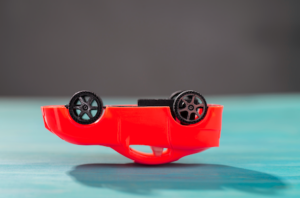First Quarter Report for 2020
The impact of the Coronavirus has affected every part of the Australian economy including affecting asset values in the automotive, road transport, construction, manufacturing, mining, aviation and marine sectors.
Asset values do not have the volatility we might expect from the share market with large daily or even weekly fluctuations. Asset values may drop and rise at varying speeds however they tend to continue to track in that same direction for a period of time before reversing depending on supply in to the market of a particular asset class or until market factors impact on demand.
In the context of the coronavirus, the values across all asset classes have been negatively impacted however there has been a differing degree to this impact. In short, the automotive sector appears to have fared the worst with new car sales dropping 48.5%, with a total of 38,926 new vehicles sold across the country in comparison to the 75,550 sold in April 2019, this has not necessarily transferred through to the used car market. It would also be fair to surmise that values for used vehicles could recover more quickly than new cars as budget affected households opt for a financially sensible second hand car rather than buying new. Buyer activity over the most recent 4 weeks supports this theory.
The road transport and construction sectors have held up relatively well in comparison to the auto sector, where those assets are newer and with relatively low kilometres. The overall market appear to have only dropped 18.3% across the heavy, medium and light segments with demand remaining steady and buyers continuing to invest in second hand assets.
Interested in attending? Don’t forget to click here to register your interest and submit any questions beforehand
Road Transport
Key Point Summary
- The slump in truck and van sales has been exacerbated by the effects of the Coronavirus as many businesses are prohibited from operating.
- Factory production of Kenworth, DAF, Peterbilt and MX Engines will be suspended between March 24 until April 6, 2020, in accordance with new government mandates.
- Volvo is down 11% YTD compared to Kenworth (traditionally the market leader) who is down 30% YTD.
- Volvo Group Australia announced a temporary four-week shutdown of the Wacol, Queensland manufacturing plant.
- Demand for tippers and tipper trailers has dropped significantly over the quarter.

New Truck Market
The new truck market has been struggling since the end of last year and the depressed truck sales numbers have carried over in to the first quarter of 2020. The slump in truck and van sales has been exacerbated by the effects of the Coronavirus as many businesses are prohibited from operating. This has translated to a drop of 23% YTD to April in the Heavy Duty segment, down 17.5% in the medium duty segment and down 14.5% in the light duty segment. Tony McMullan, CEO of Truck Industry Council has said the effects of Coronavirus for the new truck sales will be seen in the May and June numbers, and will provide the industry with a better indicator of the market ahead.
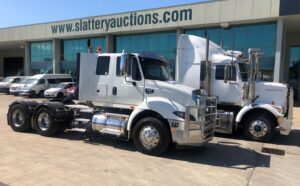 It is important to note that whilst the overall truck market was down for the year to date, it was already tracking down prior to the outbreak of the Coronavirus. It is also interesting to note that the impact of lower sales is being felt to differing degrees by the manufacturers with Volvo appearing to perform best in the current conditions. Volvo is down 11% YTD compared to Kenworth (traditionally the market leader) who is down 30% YTD. Volvo, who in recent years has snatched the number 1 position from Kenworth on the occasional month, is now holding poll position for year to date figures with 558 units sold representing approx 18% of the market against Kenworth at 17%. In Response to the current Coronavirus pandemic, Volvo Group Australia announced a temporary four-week shutdown of the Wacol, Queensland manufacturing plant. The closure became effective April 13, with work set to resume on May 10.
It is important to note that whilst the overall truck market was down for the year to date, it was already tracking down prior to the outbreak of the Coronavirus. It is also interesting to note that the impact of lower sales is being felt to differing degrees by the manufacturers with Volvo appearing to perform best in the current conditions. Volvo is down 11% YTD compared to Kenworth (traditionally the market leader) who is down 30% YTD. Volvo, who in recent years has snatched the number 1 position from Kenworth on the occasional month, is now holding poll position for year to date figures with 558 units sold representing approx 18% of the market against Kenworth at 17%. In Response to the current Coronavirus pandemic, Volvo Group Australia announced a temporary four-week shutdown of the Wacol, Queensland manufacturing plant. The closure became effective April 13, with work set to resume on May 10.
Volvo Group Australia president and chief executive office Martin Merrick commented on their decision; “Volvo and Mack trucks have an identity indelibly etched into the Australian transport industry. We build these trucks here in Australia with pride.”
Paccar producer of Kenworth, DAF, Peterbilt and MX also choose to suspend truck production worldwide, this included its Bayswater operation in Melbourne, due to “recent changes in customer demand and a weaker outlook for the global economy, as a consequence of the coronavirus pandemic.”
The shutdown was from 24th March 24 until 26th of April, and is being reviewed on a regular basis. Paccar said it will continue to provide aftermarket support to its customers. The company is also adjusting its 2020 financial outlook.
With these closures, wait times have been reported to be 15 weeks. This will make an interesting battle for truck watchers for the rest of the year.
The below graph shows the year starting build up with increasing sales before slumping in April. It is worth noting that trucks often have lead times in the months, so we expect the number of new trucks to drop further over the coming months.
Secondary Truck Market
The secondary market for road transport assets throughout April is telling a different story however with relatively strong auction results for used trucks across the country. Whilst generally sales results have held up well, these good results in the current environment have also been interspersed with some assets getting no interest at all. Essentially, good quality and late model trucks have been selling above valuation whereas older trucks with more than 1,000,000kms continue to be very difficult to sell.
Anecdotal feedback from some commercial truck dealers is that there is a lot of value on offer in the current market. Those dealers with the funding to do so, are pursuing the opportunity by actively buying trucks in the current market believing there will be significant opportunities to sell these trucks for good profits in 6 to 9 months’ time. This strategy is based on the assumption that the coronavirus will be brought under control and the government will pursue an infrastructure led stimulus package creating demand for trucks, plant and equipment. These same individuals employed the same strategy during the GFC crises to great success.
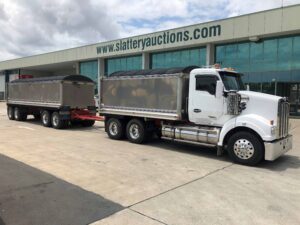 The above approach could go some way to explaining why some assets have held their value better than anticipated during the early stages of this crisis. There is also a belief in some quarters that there is a slight lag in auction results and that the true impacts of the Coronavirus on asset prices is yet to be fully felt on truck, plant and machinery asset prices.
The above approach could go some way to explaining why some assets have held their value better than anticipated during the early stages of this crisis. There is also a belief in some quarters that there is a slight lag in auction results and that the true impacts of the Coronavirus on asset prices is yet to be fully felt on truck, plant and machinery asset prices.
Across the country, the Queensland market has largely been unaffected for well-known brands such as Volvo, Kenworth, Mack and Western Star all achieving strong results despite a slight reduction in buyer participation throughout April. Our Western Australian office reported that April saw better auction results then what was expected, with results coming in close to the valuations for those assets and an overall clearance rate of 83%. Surprisingly sales in Victoria were reported back as stronger in April than what was achieved in March and New South Wales experienced mixed results with some assets selling quite strongly and a real lack of demand in other areas.
Our Perth auctions achieved some good results despite noticing a slight decrease in buyer participation throughout the month. The highlights from this auction was the sale of a 2014 Mack 8×4 Metroliner Hook Lift Truck that sold for $117,250 and achieving 85% of retail value , 2015 Isuzu NPR 300 Dual Cab Tipper which sold for $27,000 and achieved 70% of retail value and a 2016 PTE Beavertail Trailer which sold for $21,500 and achieved 93% of retail value.
Sales for mid-size Japanese trucks in Melbourne were very strong during April however the larger prime mover market struggled with very few of these assets selling. The highlight from the Melbourne April truck and machinery auction was a 2012 Kenworth Tipper that sold for $104,000 which was 23% above valuation and 85% of retail value.
The auction results at our Newcastle and Sydney branches for the first period since the Coronavirus restrictions have been in place have been varied. The New South Wales team have experienced increased buyer participation and engagement as compared to other states and feedback from the market is that buyer’s are unsure of what the market is doing, and this lack of uncertainty is driving these fluctuating results.
The results in New South Wales that have run counter to expectation with higher April results than March include a 2011 Mack Granite prime mover with 737,258 kms for auction that sold for $30,000, and achieved 75% of retail value this same truck was originally offered for auction in February and only received a high bid of $27,500. We have also seen several end users purchasing secondary equipment in April, with a 1997 Freighter Tri-Axle Flat Top Trailer selling for $16,250 and achieving 80% of retail value. This same trailer was offered for auction in March and only received a high bid of $10,250. An asset of this age we would only expect to sell in the vicinity of $12,000 – $14,000 as the market for these assets over the past twelve months has been quite tough.
Secondary Trailer Market
The Brisbane team have noted that trailers have been difficult to sell over the quarter, which is not related to the Coronavirus but has been the ongoing market conditions. Demand for tippers and tipper trailers has dropped significantly over the quarter. Good quality, late model tippers that sold extremely well in the last quarter of 2019 are attracting little interest, and prices achieved for these assets have come off around 5-10%. There is virtually no demand for older tippers in the current market. In March QLD sold a 2018 Kenworth T610 Tipper with a 2018 Hercules Quad Dog in immaculate condition for $352,000 (100% of retail) only after an extended marketing period. However demand for side tippers remains strong, at our February Truck & Machinery auction we sold a 2012 Lusty Side Tipper for $58,000, 95% of retail. At our March Roma auction we sold a 2012 Azmed Side Tipper Road Train Trailer for $83,000, 95% of retail. Prior to the impacts of the Coronavirus, good quality curtainsiders, particularly drop and step deck trailers were still attracting a lot of buyer interest, whereas other trailers have dropped off the radar. During the February Truck & Machinery auction in Brisbane we saw the sale of a 2009 Maxitrans Step Deck Cutrainsider sell for $41,000, this achieved 100% of retail value.
In New South Wales we saw strong results for heavy haulage assets, in particular the sale of a dolly and low loader that was valued at $60,000, and sold for $87,000, this achieved 105% of retail value. A 3 row of 8 platform low loader that was valued at $120,00 sold for $180,00, achieving 100% of retail and a 4 row of 4 quad low loader that was valued at $100,000 sold for $105,000. This shows that good quality trailers that are used for moving heavy equipment are still sought after in the current market.
In Victoria, the secondary trailer market has seen an improvement, particularly in the refrigerated trailers. Demand for rental trailers has increased with large movements of produce from Tasmania to Brisbane as a result of the moderate weather conditions. We witnessed at our March Truck and Machinery Auction one local end user snap up a clean well maintained 2015 Southern Cross ST3 Refrigerated Trailer for $92,480 and put it straight to work. Current delivery times on refrigerated trailers for leading brands, Vawdrey, FTE and Maxitrans is varying from three to five months dependent on specifications.
Machine movements throughout Victoria have remained consistent throughout the quarter, the Level Crossing Removal project is currently playing an active role in this sector with major sections of the line having work completed, at our February truck and machinery auction a 2017 ATM 13m Drop Deck Plant Trailer sold for 100% of the retail cost to an end user for $59,800.
| Assets | Kms/Hours | Price Achieved | % of retail | State |
|---|---|---|---|---|
| 2017 JP Trailers Tri-Axle Step Deck Trailer with Ramps | $68,000 | 124% | NSW | |
| 2018 Mitsubishi Fuso FK 600 | 31,760 | $54,000 | 100% | QLD |
| 2018 Kenworth T610 Tipper with 2018 Hercules Quad Dog | 284,635 | $352,000 | 100% | QLD |
| 2009 Maxitrans ST3 Step Deck Curtainsider | $41,000 | 100% | QLD | |
| 2008 Rhino Quad Axle Deck Widener | $100,000 | 100% | QLD | |
| 2015 Volvo FM500 6x4 Prime Mover | 194,259 | $137,000 | 100% | VIC |
| 2000 International 4900 Sliding Tilt Tray | 289,357 | $54,400 | 100% | VIC |
| 2007 International Eagle 9900 6x4 Prime Mover | 1,170,693 | $33,700 | 100% | VIC |
| 2017 ATM 13m Drop Deck Plant Trailer | $59,800 | 100% | VIC | |
| 1994 Tieman Tri Axle 27,000L Tanker | $21,900 | 100% | VIC | |
| 2017 Mitsubishi 6x4 FV51 Tipper | 14,220 | $132,000 | 100% | NSW |
| 2012 Kenworth T659 Prime Mover | 915,477 | $140,000 | 95% | QLD |
| 2012 Lusty Side Tipper A Trailer | $58,000 | 95% | QLD | |
| 2013 Volvo FM370 4x2 Prime Mover | 304,792 | $44,600 | 93% | VIC |
| 2015 JP Trailers Tri-Axle Plant Trailer with Ramps | $32,000 | 91% | NSW | |
| 2018 Isuzu NPR Series | 8,029 | $36,000 | 90% | QLD |
| 2013 Kenworth K200 Prime Mover | 930,143 | $56,000 | 90% | QLD |
| 2012 Kenworth T909 Prime Mover | 715,309 | $121,000 | 90% | QLD |
| 2015 Southern Cross ST3 Tri-Axle Refrigerated Pantech | $92,450 | 90% | VIC | |
| 2012 Azmeb Side Tipper Road Train Trailer | $83,000 | 90% | QLD | |
| 2018 Freighter ST3 Drop Deck 'A' Curtainsider Trailer | $65,200 | 90% | VIC | |
Earthmoving & Mining
Key Point Summary
- IBISWorld analysts have adjusted projections for the Mining and Construction Machinery Manufacturing industry from a decline of 6.0% to 18.9% in 2019-20.
- Caterpillar have reported revenues of $10.6 billion in the first quarter, a decrease of 21% compared with $13.5 billion in the first quarter of 2019.
- Across the Asia Pacific all Caterpillar segments are down for the first quarter.
New Earthmoving & Mining Market
 IBISWorld analysts have adjusted projections for the Mining and Construction Machinery Manufacturing industry from a decline of 6.0% to 18.9% in 2019-20 due to a significant decline in private capital expenditure as a result of the Coronavirus Pandemic. They further forecast the industry is expected to post a loss in 2019-20, before returning to profitability in 2020-21, and that the industry is likely to quickly recover from the Coronavirus downturn, in line with a resurgence in global economic activity.
IBISWorld analysts have adjusted projections for the Mining and Construction Machinery Manufacturing industry from a decline of 6.0% to 18.9% in 2019-20 due to a significant decline in private capital expenditure as a result of the Coronavirus Pandemic. They further forecast the industry is expected to post a loss in 2019-20, before returning to profitability in 2020-21, and that the industry is likely to quickly recover from the Coronavirus downturn, in line with a resurgence in global economic activity.
Looking into the results from the market leader, Caterpillar have reported revenues of $10.6 billion in the first quarter, a decrease of 21% compared with $13.5 billion in the first quarter of 2019.
Across the Asia Pacific all Caterpillar segments are down for the first quarter with sales into construction industries down 31%, resource industries down 29%, energy and transportation down 19% on prior years. Much of the drop in sales demand in the Asia Pacific region can be attributed to the large drop in sales in China. Mining equipment sales were lower due to weakness in certain commodities. In addition, demand decreased for equipment supporting non-residential construction and quarry and aggregates.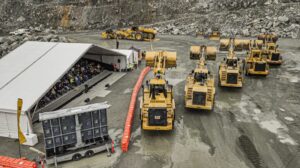
Secondary Earthmoving & Mining Market
The market for second-hand mining & earthmoving equipment has slowed considerably with enquiry levels and buyer engagement dropping off. Asset values will obviously suffer as a consequence, and it would not surprise to see values decline by 15 -25% across the board.
With the recent turmoil of Coronavirus, the construction and mining industries continue to operate as business as usual (as much as possible). The government has recognized the importance of these industries continuing as others have had to cease operating in these unsettled times. Due to this, there is still some demand for good quality civil assets. However, it must be noted that business confidence is still extremely rocky, and many civil contractors and earthmoving companies are in a very conservative phase given the current uncertain climate and the possible need to have access to funds rather than tied up in new equipment.
Since the outbreak of coronavirus in Australia, one prevalent dealer stated that he is receiving approximately half the number of enquiries as previous.
There is still reasonably solid demand for small earthmoving equipment, i.e. excavators under 13 tonne and skid steer loaders
 Small civil equipment such as excavators 15 tonne and under and skid steer loaders continue to sell well, however larger equipment has seen a reduction in buyer demand and buyer interest
Small civil equipment such as excavators 15 tonne and under and skid steer loaders continue to sell well, however larger equipment has seen a reduction in buyer demand and buyer interest
| Assets | Kms/Hours | Price Achieved | % of retail | State |
|---|---|---|---|---|
| 1998 Tadano TG500E 50 Tonne Mobile Crane | $108,000 | 120% | QLD | |
| 2015 Hitachi XC135-US3 Excavator | 6,483 | $73,000 | 110% | QLD |
| 2006 Komatsu PC228US-3EO Excavator | 6,032 | $59,800 | 100% | VIC |
| 2008 Toyota 62-8FD25 Forklift | 608 | $11,400 | 95% | WA |
| 2013 JCB 3CX AEC Backhoe Loader | 4,818 | $50,000 | 95% | QLD |
| 2018 Caterpillar 432F2 Backhoe | 149 | $114,000 | 95% | VIC |
| Caterpillar 815B Compactor | 21,087 | $50,000 | 90% | QLD |
| 2018 Sumitomo SH210-6 Excavator | 962 | $142,500 | 90% | QLD |
| 2008 Caterpillar 930H Wheel Loader | 10,990 | $85,000 | 90% | QLD |
| 2003 Komatsu PC30MR-2 Excavator | 1,630 | $19,600 | 90% | VIC |
| 2008 Caterpillar 320D Tracked Excavator | 7,756 | $76,100 | 90% | VIC |
Agriculture
Key Point Summary
- Machinery sales within the agricultural sector have improved throughout the first quarter and has been the sector least impacted by the Coronavirus.
- February saw Tractor sales fall 2% behind the sales for the same period in February 2019.
- Hay Baler sales have declined 36% in February in comparison to the results if 2019
- There has been a 40% increase in sales on April 2019, putting the total tractor sales 7% head for the year.
New Agricultural Market
Machinery sales within the agricultural sector have improved throughout the first quarter and has been the sector least impacted by the Coronavirus. The improvement in sales within the agricultural market can be correlated to the widespread rainfall in drought affected areas of Queensland and New South Wales. This brought renewed optimism from farmers. Combined with the recent economic initiatives that were put into place by the Federal Government only in April in relation to Coronavirus such as the accelerated depreciation allowance there has been a flow on effect and increased movement within the industry.
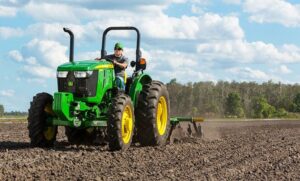 February saw Tractor sales fall 2% behind the sales for the same period in February 2019. On a state by state basis, we saw Victoria sales up by 13%, New South Wales down 6%, Queensland down 11% and Western Australia down 7%. Sales in March saw an increase of 5% in unit numbers but a 10.8% decrease in terms of dollar figures, for the same period in 2019, with the overall sales trailing 3.2% behind the previous year results. The March results on a state by state basis put Victoria up 32% and New South Wales up 13% for the month. Queensland was down 9% and Western Australia is down 30% for the month.
February saw Tractor sales fall 2% behind the sales for the same period in February 2019. On a state by state basis, we saw Victoria sales up by 13%, New South Wales down 6%, Queensland down 11% and Western Australia down 7%. Sales in March saw an increase of 5% in unit numbers but a 10.8% decrease in terms of dollar figures, for the same period in 2019, with the overall sales trailing 3.2% behind the previous year results. The March results on a state by state basis put Victoria up 32% and New South Wales up 13% for the month. Queensland was down 9% and Western Australia is down 30% for the month.
Combined Harvester sales continue to be challenging with only a small number of sales in January, February and April, with no expectations that these results will improve in 2020. Hay Baler sales have declined 36% in February in comparison to the results if 2019, however the sales for Baler’s are up 3% for the month of April in comparison to the same period last year.
April has seen very strong results for tractor sales across most of the industry within Australia, this has been driven by the increase in the instant asset write off program, with a 40% increase in sales on April 2019, putting the total tractor sales 7% head for the year. The greatest increases came from the Eastern states, with Victoria sales increasing by 44%, NSW is up 38% and Queensland who has seen the strongest results is now up 78% in comparison to April 2019. Sales in Western Australia continued to decline in April, down an additional 10% on sales for the same period in 2019.
Secondary Agricultural Market
The secondary agricultural sector has seen more confidence in the first quarter of 2020 across the country. In Queensland and New South Wales we have seen this market hold up reasonably well, despite the lack of secondary equipment entering the auction space. This is due to the recent rainfalls we have seen across the two states, that were previously battling drought conditions.
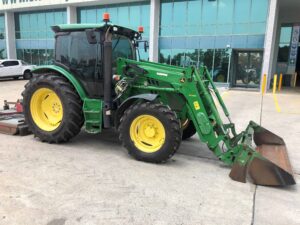 In particular we have seen demand for good quality grain tippers in Queensland, with a 2009 Tefco A&B Grain Tipper set selling for $92,000 at our February truck and machinery auction. This result represents 110% of retail value. Further evidence that the secondary agricultural market is holding up can be highlighted in the sale of a Homan Blade Plough with Seed Box that sold for $53,200 and achieved 120% of retail value, and a 2009 Hino 500 with Stock Crate that sold for $66,600 and achieved 100% of retail. In Western Queensland, we saw the sale of a 2005 Haulmark Double Deck Stock Crate A&B set, this sold for $98,000 and achieved 95% of retail value. Dealers in the New South Wales market are expecting to see an increase in demand and spike in prices for good quality, second hand agricultural assets in the second quarter of 2020, due to an increased hope for a successful winter crop.
In particular we have seen demand for good quality grain tippers in Queensland, with a 2009 Tefco A&B Grain Tipper set selling for $92,000 at our February truck and machinery auction. This result represents 110% of retail value. Further evidence that the secondary agricultural market is holding up can be highlighted in the sale of a Homan Blade Plough with Seed Box that sold for $53,200 and achieved 120% of retail value, and a 2009 Hino 500 with Stock Crate that sold for $66,600 and achieved 100% of retail. In Western Queensland, we saw the sale of a 2005 Haulmark Double Deck Stock Crate A&B set, this sold for $98,000 and achieved 95% of retail value. Dealers in the New South Wales market are expecting to see an increase in demand and spike in prices for good quality, second hand agricultural assets in the second quarter of 2020, due to an increased hope for a successful winter crop.
In Victoria we saw a set of 2017 ILGI 1-ARGK-500 5M Multi Disc Tillers offered at our January machinery auction, which sold for $27,200 and achieved 100% of retail value. This is further evidence that buyer’s confidence is returning, in this market. We continue to see ex-council landscaping equipment generate interest from buyers, with many willing to pay a premium for well-maintained machinery.
| Assets | Kms/Hours | Price Achieved | % of retail | State |
|---|---|---|---|---|
| Homan Blade Plough with Seed Box | $53,200 | 120% | QLD | |
| 2009 Tefco A&B Grain Tipper Trailer Set | $92,000 | 110% | QLD | |
| 2017 ILGI 1-ARGK-500 5m Multi Disc Tiller | $27,200 | 100% | VIC | |
| 2005 Haulmark ST37 Double Deck Stock Crate A&B Set | $98,000 | 95% | QLD | |
| 2009 Hino 500 Series with Stock Crate | 293,317 kms | $66,600 | 95% | QLD |
| 2006 Massey Ferguson 5445 Tractor with 955 Front End Loader | 2,232 hrs | $34,800 | 92% | VIC |
| 2012 John Deer 6105R Tractor | 5,625 hrs | $48,000 | 90% | QLD |
| Kubota M9540 Tractor | 7,113 hrs | $28,500 | 90% | QLD |
| 2012 Deutz-Fahr 97HP Agrofarm 420 Tractor and Loader | 2,176 hrs | $27,200 | 88% | VIC |
Aviation
Key Point Summary
- The aviation sectors worldwide continues to feel the full economic effects of Coronavirus.
- Virgin Australia have entered Voluntary Administration, and the Federal Government has subsided an essential network of flights.
- Aviation companies with a tourism focus are continuing to remain closed due to the domestic and international restrictions.
The aviation sectors worldwide continues to feel the full economic effects of Coronavirus. Since our last update, Virgin Australia has entered Voluntary Administration, and the Federal Government has subsided an essential network of flights. Flights schedules are dramatically reduced which has complications for employees that need to travel for work.
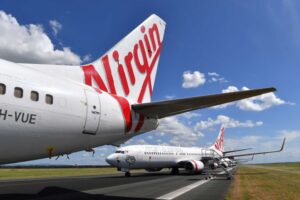 Aviation companies with a tourism focus are continuing to remain closed due to the domestic and international restrictions. It is expected that this will continue until domestic travel and holidays are allowed to resume. RPT services to remote indigenous communities have been restricted and in Queensland, there is a complete closure of access to these areas for tourists of up to 6 months to prevent the virus from entering these regions.
Aviation companies with a tourism focus are continuing to remain closed due to the domestic and international restrictions. It is expected that this will continue until domestic travel and holidays are allowed to resume. RPT services to remote indigenous communities have been restricted and in Queensland, there is a complete closure of access to these areas for tourists of up to 6 months to prevent the virus from entering these regions.
Flight schools are still operating under caution, however, if further restrictions are to be implemented by governments, this may change. We have had a number of inquiries in relation to Financial Reporting Valuations and the effect of the secondary market, however, the secondary market is yet to be tested as the market has remained relatively illiquid and there is expected to be a discount from pre Coronavirus conditions
Automotive
Key Point Summary
- The coronavirus challenges come off the back of a large drop in new car sales in 2019 and 25 consecutive months of negative growth for the auto industry in Australia.
- April, which encompasses the bulk of the sales period affected by Coronavirus, dropped 48.5%, with a total of 38,926 new vehicles sold across the country
- The global new car sales market has seen a decrease between 80 – 98% in comparison.
- Toyota continued to be leading brand for new car sales in the first quarter of 2020, with a market share of 26.5%
- Auction prices falling by 10% to 20% at auctions run by Slattery and the auction clearance rate dropping up to 35%.
New Automotive Market
New car sales continue to drop across Australia, with the FCAI chief executive, Tony Weber, placing the blame directly on the impact of the coronavirus and stating that the car industry is in crisis mode globally. Many car dealerships have seen reduced traffic and softening sales throughout the country and are struggling to manage the enormous drop in demand. The coronavirus challenges come off the back of a large drop in new car sales in 2019 and 25 consecutive months of negative growth for the auto industry in Australia.
March sales results for new cars dropped 17.9% for the month compared to March last year and April, which encompasses the bulk of the sales period affected by Coronavirus, dropped 48.5%, with a total of 38,926 new vehicles sold across the country in comparison to the 75,550 sold in April 2019. While this drop can be viewed as a volatile market, the global new car sales market has seen a decrease between 80 – 98% in comparison.
The biggest downturn in the Australian new car market was in Victoria, New South Wales & Queensland, which all suffered sale declines of more than 50%, whereas Australian Capital Territory saw an increase of nearly 25% on the same period in 2019. The Australian Automotive Dealers Association and the Tractor Machinery Association has begun lobbying for the Federal Government to extend the $150,000 instant asset write off, as most buyers have not been able to take advantage of the tax incentive and believes this will go towards helping the car industry to recover.
Toyota continued to be leading brand for new car sales in the first quarter of 2020, with a market share of 26.5% and accounts for five of the top 10 vehicles in Australia for the first time in History. These are the Hilux, Rav4, Corolla, Prado 4WD & Landcruiser. Interestingly, SUV’s made up 48% of all sales in March showing that consumer tastes in this market segment is continuing to grow.q
Secondary Automotive Market
The impact of the Coronavirus has been most acutely felt in the used auto market throughout April, with auction prices falling by 10% to 20% at auctions run by Slattery and the auction clearance rate dropping up to 35%. We have seen a decrease in buyer participation across all car auctions throughout the month. Media has reported larger falls in prices for other car auction houses and car dealers by as much as 40% so we are continuing to monitor results for the full impact across the sector.
Drops in values for used cars in the secondary wholesale market is largely due to the double impact of reduced demand stemming from car dealers closing their cheque books as they reduce their inventories and preserve their cash position as well as more supply coming from fleet owners, such as rental car companies, offloading surplus stock to increase their cash position to manage through the downturn.
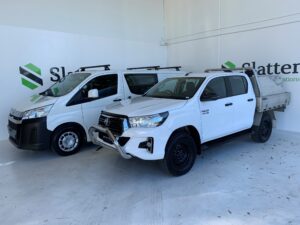 With Rental Car companies looking to reduce their fleets during this period, we have seen prices reduce for Toyota Corolla, Cerato & Yaris’s and Hyundai i30’s across the country. This can be seen in the comparison of two Toyota Corolla Accent Sports that we sold at our car auctions in February and April in Sydney. The Corolla we sold in February fetched $19,000 at auction, whereas in April the exact same vehicle only made $16,500 at auction and only achieved 86% of retail value.
With Rental Car companies looking to reduce their fleets during this period, we have seen prices reduce for Toyota Corolla, Cerato & Yaris’s and Hyundai i30’s across the country. This can be seen in the comparison of two Toyota Corolla Accent Sports that we sold at our car auctions in February and April in Sydney. The Corolla we sold in February fetched $19,000 at auction, whereas in April the exact same vehicle only made $16,500 at auction and only achieved 86% of retail value.
It is fair to say that in the Coronavirus affected market, not all makes and models are equal with large variations in those makes and models being most impacted. Commercial vehicles are still holding their value in this market, in particular we continue to see strong results for Toyota Hilux’s. This can be seen in the sale of a 2018 Toyota Hilux from our Melbourne office, that sold for 126% of valuation. We sold three Hilux’s out of Sydney that all achieved 20% above the valuation and achieving over 85% of retail value. While Toyota vehicles perform well, we have seen the sale of other commercial vehicles perform well, including a 2016 Volkswagen Amarok in Melbourne that sold for $34,000 and achieved 85% of retail value and a 2018 Volkswagen Amarok in Sydney that sold for $42,200 and achieved 84% of retail value. However, there has been a decline for secondary brands such as the Great Wall, which has seen values be reduced by up to 30%.
We have seen a slight softening in the market for Luxury cars in the first quarter for 2020, with a 2017 Audi SQ7 selling for $74,100 and a Land Rover Discovery selling for $63,700 in Newcastle. We also saw the sale of a 2017 Range Rover Sport at our Melbourne Auctions that sold for $80,000 and achieved 100% of retail value and a Porsche Cayman in Sydney that sold for $71,000 and achieved 100% of retail value.
| Assets | Kms/Hours | Price Achieved | % of retail | State |
|---|---|---|---|---|
| 2006 Toyota Landcruiser | 182,646 | $44,600 | 120% | QLD |
| 2017 Range Rover Sport 3.0 TDV6 | 26,041 | $80,000 | 100% | VIC |
| 2017 Subaru XV | 27,129 | $24,500 | 100% | NSW |
| Porsche Cayman | 19,102 | $71,000 | 100% | NSW |
| 2015 WRX STi Premium | 35,167 | $35,400 | 95% | WA |
| 2018 Ford Transit Custom | 31,998 | $28,700 | 95% | QLD |
| 2017 Toyota C-HR Koba | 12,243 | $28,200 | 95% | QLD |
| 2016 Holden Colorado LS-X | 88,639 | $8,362 | 95% | QLD |
| 2017 Isuzu D-Max LS-U Hi-Ride (4x4) Crew Cab | 44,001 | $33,500 | 95% | VIC |
| 2016 Ford Transit Custom | 61,164 | $22,700 | 94% | WA |
| 2018 Volkswagen Amarok Highline | 36,425 | $43,400 | 94% | WA |
| 2018 Mitsubishi Triton GLS (4x4) | 28,936 | $31,000 | 93% | VIC |
| 2016 Mazda BT-50 XTR (4x4) | 91,972 | $28,000 | 91% | VIC |
| 2017 Holden Colorado LTZ | 60,107 | $34,500 | 90% | QLD |
| 2019 Toyota GXL Landcruiser | 7,414 | $71,500 | 90% | QLD |
| 2017 Ford Ranger XLT | 32,362 | $38,900 | 90% | NSW |
| 2015 Volkswagen Amarok TDI420 Ultimate (4x4) | 82,865 | $28,500 | 89% | VIC |
Slattery Asset Advisory
Valuations
Despite a slower start to the Year, the Asset Advisory Team experienced strong demand in March continuing into April.
Pre Coronavirus, we conducted numerous jobs for the Banking, Finance and Insolvency sectors and this has now started to slow as Banks and Insolvency firms place moratoriums on pursuing any clients in default.
We are experiencing increased deal flow from other areas including Insurance, Family Law and Acquisition Activity.
A number of Finance Companies, including Banks, have approached us to prepare Secondary Market Guides (Motor Vehicles, Trucks and Heavy Machinery) including depreciation schedules to assist them when considering finance and setting residual asset values.
We have also had the opportunity to utilise our Aviation Experts in conducting valuations on a few helicopters and some unique Aircraft.
Whilst Coronavirus is posing challenges for our Valuers due to market uncertainty and limited comparables, we are as diligent as ever when doing research and understanding the market.
Asset Recovery
As the impact of Coronavirus start to flow through, in the Debt Recovery space we are turning our thoughts to what lies ahead.
If forward Bank provisioning is a reliable indicator we can expect that, (come the end of the imposed moratorium) we may see an unprecedented amount of activity.
Well capitalised, long term Bank customers will be carefully assisted through a difficult period with opportunities to assist cashflow by releasing excess assets.
At the other end of the scale we unfortunately anticipate an escalation in the number of defaults and insolvency cases.
Slattery Recoveries are gearing up to assist existing Bank & Finco Partners, whilst fielding increasing numbers of new requests to act as an outsourced support during this Credit cycle as resources become severely stretched.
